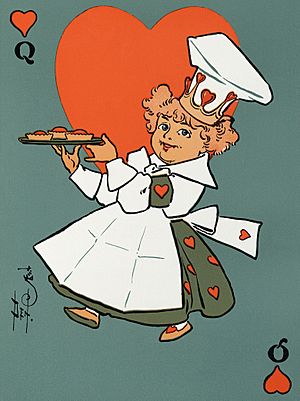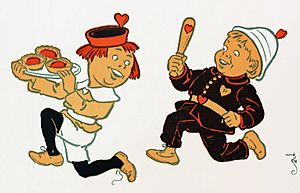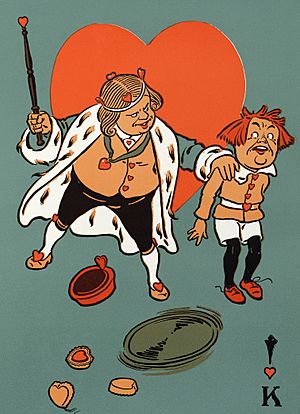The Queen of Hearts (poem) facts for kids

"The Queen of Hearts" is a well-known English poem and nursery rhyme. It is based on the characters you see on playing cards. An unknown writer first published it in a British magazine called the European Magazine in April 1782.
The poem was originally published with three other less famous parts. These were about "The King of Spades", "The King of Clubs", and "The Diamond King". However, some experts like Iona and Peter Opie believe these other parts were added later to an older poem. "The Queen of Hearts" became much more popular than the others. Even though it first appeared in a magazine for adults, it soon became a favorite nursery rhyme for children. By 1785, people had already set it to music.
What Happens in the Poem?
The poem tells a simple story using characters from playing cards.
The Queen of Hearts bakes some delicious tarts. Then, the Knave of Hearts (a character similar to a jack or prince on a playing card) secretly takes all of them. The King of Hearts, who is the Queen's husband, asks for the tarts. He gets very angry and punishes the Knave. After being punished, the Knave brings the tarts back. He promises never to steal again.
Here is the poem:
- The Queen of Hearts
- She made some tarts,
- All on a summer's day;
- The Knave of Hearts
- He stole those tarts,
- And took them clean away.
- The King of Hearts
- Called for the tarts,
- And beat the knave full sore;
- The Knave of Hearts
- Brought back the tarts,
- And vowed he'd steal no more.
Who Inspired the Characters?
People have wondered if the Queen of Hearts character was based on a real person. One idea from Katherine Elwes Thomas is that the Queen of Hearts was based on Elizabeth of Bohemia.
However, a scholar named W. Gurney Benham studied the history of playing cards. He said that the old nursery rhyme about the Knave of Hearts and the tarts might just be popular because "hearts" rhymes with "tarts." Sometimes, rhymes are just for fun and don't have a deep hidden meaning!
How the Poem Was Used in Other Stories
The story of "The Queen of Hearts" has been used in many other books and films.
In 1805, a writer named Charles Lamb wrote a longer poem called King and Queen of Hearts: with the Rogueries of the Knave who stole the Queen's Pies. This poem took each line of the original rhyme and added more verses to explain it.
Later, in 1881, Randolph Caldecott created a "Picture Book" based on "The Queen of Hearts." He was famous for illustrating nursery rhymes.
The poem is also a very important part of Lewis Carroll's famous book, Alice's Adventures in Wonderland. In Chapter XI, called "Who Stole the Tarts?", the poem is used as a key piece of evidence during a funny trial of the Knave of Hearts. This part of the book makes fun of how the British legal system worked. The poem became even more popular after it was included in Carroll's book.
In the 1972 film Alice's Adventures in Wonderland, the actor Michael Crawford sings this nursery rhyme.



